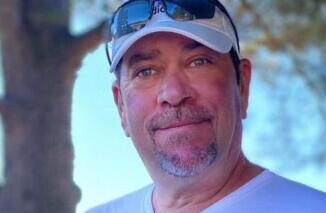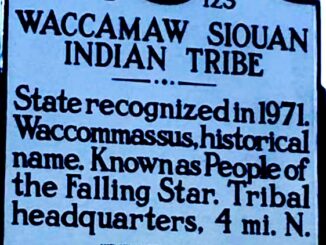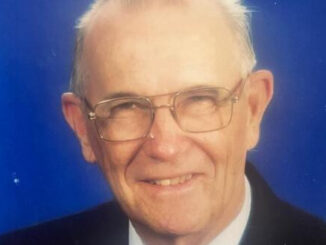
We call it the Blue Room, simply because that’s the color of the walls.
The modern term is “man cave,” which I despise almost as much as the phrase “she shed.” My blue room is sometimes called the Office, but that gets confused with the place where I earn a living. The traditional term “study” just doesn’t fit, although that’s one activity that takes place there.
It’s a place where I can write; play music a little too loud; organize, find and read books; tinker with firearms; and frustrate myself with building miniatures. If you have ever watched one of my storytime programs on social media, you’ve been a virtual guest in the Blue Room.
All my life, there has been a similar place in whatever house we called home. When my folks lived in Clinton, and we all wrote for the highest bidder, the “office” was truly an office, much more akin to a real newsroom, sometimes with all three of us on the telephone or writing at the same time. It was madness at times, but it was a shared family madness that was never the same when Papa passed away. There have been other offices and studies and similar rooms with different names.
A year ago, I was making a steadfast effort to finally get it situated as I wanted, so I could actually, maybe, get some work done in there. A year ago, it was something of a luxury.
Then along came the pandemic, and things changed.
As February turned into an early spring in March, Miss Rhonda attacked the Blue Room with a vengeance. Rumors swirled about stay-at-home orders and curfews and quarantines and other pandemic panic. Seemingly within days, I had a place where I could work from home (as long as my devices are oriented toward the right window).
The Blue Room is far busier than it was pre-pandemic, but that’s just another change coming out of 2020. For a while, I had to work there; when I got a new job, I wasn’t as bound by schedules that provided social distancing, but some of today’s attendant duties sometimes require a quiet place.
There are hundreds of books on the mismatched, sagging shelves, with a few hundred more awaiting their turns out of a box. Some are ancient, dating far beyond and through the time when our country was torn apart and most of my family leaned toward the southern side of an imaginary line.
There are modern history books, both the academic kind and “coffee table” books of mostly pictures, detailing or illustrating the causes, effects and results of a couple world wars, two or three financial upheavals (mainly the Great Depression) and other events, both arcane and archaic. There are books describing why things happened, what might happen, what could have happened, and what did happen to get America to the place where it happened to be when the particular writer sat down in front of a typewriter and rolled a sheet into the platen or stared at a blinking cursor and started making words into sentences on a computer screen.
Some of the predictions are laughable; some of the analyses are beyond ridiculous. Some are as frighteningly prophetic as anything in the half-dozen or so Bibles of different translations that repose nearby. Some publications are cheek by jowl with dissenting opinions, making it easier to truly see both sides of an issue in the proper perspective.
There are artifacts, too; iron from a blockade runner, rocks, an arrowhead or two, political buttons, a broken knife blade, bullets and shell fragments from several battlefields, a coffin handle, tools that might have been made by my great-great-grandfather before the War Between the States, when he created a business that still exists today.
There are filefolders and boxes of memory cards, chock full of clippings and research, letters and postcards, addresses and dried-up inkpens. Some of the folders are fat with nothing of consequence; others are slim files of letters, while still others are entire folders that begin with a criminal incident report and end with verdicts by juries (and appeals courts). Some are far more mundane, things that were vitally important at the time but now bring blank stares if mentioned in even the most informed society. Things change.
Aside from fascinating the odd cat who trespasses in the Blue Room, all those things – the books, the artifacts, the paperwork — do actually serve a purpose. Tucked away on those hundred-year-old bookcases are examples of other times our country, my own family, has faced challenges.
Each time, things were worse than they had ever been before. That things may have never been worse in someone’s lifetime is not something I will dispute, but “worse” is a perspective with a lot of angles. Clipping coupons and budgeting to deal with rising grocery prices in a free country is far different from living on a cup of rice paste a day begrudgingly allowed by a warlord. Watching the return on an investment crash is different than working for a dollar a day. Having to downsize a home is different than loading all you have left into a rattletrap car and heading across the country with five pounds of lard, some coffee beans, and a few dollars after losing a farm.
I guess what I am hammering at is that yes, things are troubling right now. By the time you read this, the last U.S. Senate races should be decided; maybe the presidential race will be settled. It’s likely we will have topped another milestone in COVID-19 deaths, hospitalizations, or whatever statistic seems the most deliciously horrible for the media on that particular day. Heck, we might even be in a shooting war with Iran.
But things have, indeed, been worse.
Maybe not for you personally. Maybe not for your family. Maybe not even in your parents’ lifetimes. Things have been worse, and we came out on top.
America is like that, and we can be again. We can again learn how to disagree without hatred, and how to criticize without going to court.
We can do it. But we must want to be that way again.
We can destroy the Republic, or we can make it even stronger. America’s enemies have loudly declared us down and out before, back when we didn’t have social media or quite as many biased news outlets gleefully running down the country and any hope for the future. Nor were there quite as many of the enemy among our own people.
We came back with a vengeance.
As long as we can pull both sides back somewhat closer to the middle, and realize that God has given us in another new year in the greatest country on earth—well, there’s still a chance we could turn all this into nothing more than another significant time in history, another dusty book to be filed on a shelf in someone’s Blue Room.
Folks, we have another year, another chance.
Happy New Year. Let’s fix this.
















